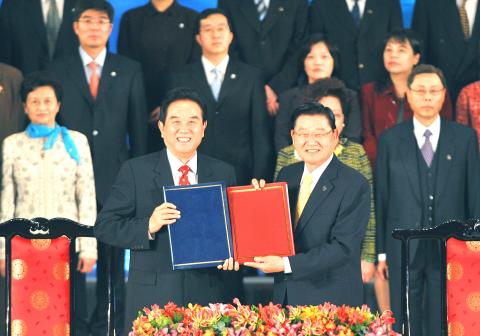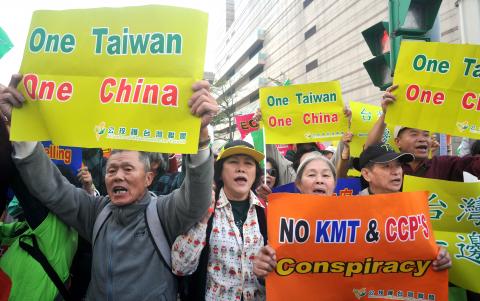|
Cross-strait medical agreement inked
QUESTIONABLE METHODOLOGY?The DPP said the pact fails to
specify which country’s medical standards should be followed for drug testing
and clinical trials
By Ko Shu-ling / Staff Reporter

Straits Exchange Foundation Chairman Chiang
Pin-kung, right, exchanges a signed agreement on medical and health care
cooperation with Association for Relations Across the Taiwan Strait Chen Yunlin
at the Grand Hotel in Taipei yesterday.
Photo: Patrick Lin, AFP
Taipei and Beijing signed an agreement on medical and health
cooperation yesterday, with officials saying they hoped to ink an accord on
investment protection in the first half of next year, when the next round of
high-level talks are held.
Straits Exchange Foundation (SEF) Chairman Chiang Pin-kung (江丙坤) said that while
the investment protection pact couldn’t be signed this time because of the
complexity of the issue, it has been placed on the agenda for his next meeting
with Association for Relations Across the Taiwan Strait (ARATS) Chairman Chen
Yunlin (陳雲林) in China. He also said he will still meet Chen twice a year, but
the scheduling and locations would be more flexible.
The two sides agreed to continue negotiations on the definition of investors,
treatment of investors, convenience of investment, expropriation of property,
compensation for loss or transfer of property, investment dispute settlement and
more.
Since the “early harvest” program of the Economic Cooperation Framework
Agreement (ECFA) will take effect on Jan. 1, Chiang said subsequent ECFA deals
on commodity trade, service trade and a dispute-resolving mechanism would also
be placed on the meeting agendas as soon as they are ready to be signed.
Straits Exchange Foundation Vice Chairman Kao Koong-lian (高孔廉) also said no
possibilities have been ruled out for cross-strait exchanges, including a
cultural deal, something Beijing has previously expressed an interest in.
However, he emphasized the importance of communication, saying an agreement
would be signed when the time was right, but there was no timetable.
Meanwhile, ARATS Deputy Chairman Zheng Lizhong (鄭立中) urged the two sides to
launch negotiations on science, education and culture as soon as possible.
The medical and health cooperation pact covers four areas: prevention of
infectious diseases, the management and development of drug safety, emergency
rescue operations and the study of Chinese medicine and its safety management.
In a bid to prevent the spread of infectious diseases, Taipei and Beijing will
regularly exchange information.
They will establish a mechanism to exchange information about drugs and jointly
crack down on counterfeit drugs. They will join forces to ensure drug safety and
quality follow international standards. The two sides will also cooperate in
clinical testing of new drugs.
Since more than 90 percent of Taiwan’s Chinese herbal medicines are imported
from China, Chinese exporters must produce certification to prove the safety of
their products and the safety checks must meet international standards.
The products will undergo three rounds of inspection — at the manufacturer, at
customs and random inspections when they are marketed.
The two sides also agreed it was necessary to establish an institutionalized
mechanism to examine the implementation of the 15 agreements and two consensuses
both sides have reached thus far.
Turning to cross-strait travel, Taiwan agreed to add 122 flights during the
Lunar New Year holiday, while China agreed to raise the daily quota of Chinese
tourists visiting Taiwan from 3,000 to 4,000, beginning on Jan. 1.
China also agreed to allow individual travelers to visit Taiwan on a trial
basis, starting with residents of certain big cities in the first half of next
year. The individual traveler trial could begin around the Lantern Festival, Kao
Koong-lian said.
Neither side released any details of the planned cross-strait economic
cooperation committee, but said it would be established soon.

Anti-China demonstrators hold placards during
a rally outside a hotel in Taipei on December 21, 2010 where Chinese envoy Chen
Yunlin is meeting with Lai Shin-yuan, Taiwan's top China policy maker.
Photo: AFP
Mainland Affairs Council (MAC) Deputy Minister Kao Charng (高長) said in a
statement that the committee was not an “unconstitutional monster” and that its
functions and operations would be open, transparent and legal.
He said the committee would handle negotiations, implementation, application and
interpretation of the ECFA or disputes resulting from it. Any agreement that
needs to be signed once the negotiations are complete will be handled by the SEF
and ARATS before being sent to the legislature for notification or review, he
said.
Reacting to yesterday’s agreement, Chinese Nationalist Party (KMT) Legislator Wu
Yu-sheng (吳育昇) said the medical deal was a breakthrough, but that all
cross-strait negotiations should be seen as positive development.
The Democratic Progressive Party (DPP) disagreed and listed a number of
deficiencies it says it has already found with the new pact.
DPP spokesperson Cheng Wen-tsang (鄭文燦) said harmonizing cross-strait medical
standards would lower the quality of the nation’s healthcare system since
Taiwan’s standards have always been modeled after the US Food and Drug
Administration.
“It will also have an impact on the health of Taiwanese,” he said, adding the
agreement did not clearly specify which country’s standards the government would
follow.
In addition, since Beijing did not have clear laws protecting human rights,
conducting joint clinical tests with Chinese hospitals would damage Taiwan’s
international image, he said.
The DPP said the government must insist such clinical trials meet international
standards.
As for a clause covering the resolution of medical disputes, Cheng said the DPP
believed the clause should have had more punitive measures, suggesting that
without them Taiwanese would continue to have a hard time asking for
reparations.
|
![]()
![]()
![]()